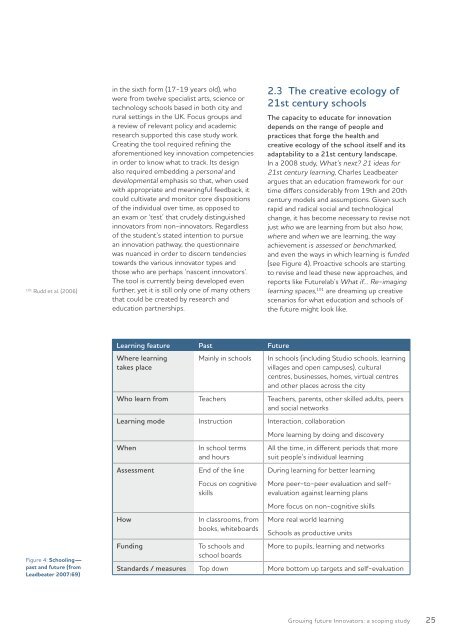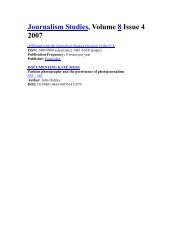GrowinG Future innovators - ARC Centre of Excellence for Creative ...
GrowinG Future innovators - ARC Centre of Excellence for Creative ...
GrowinG Future innovators - ARC Centre of Excellence for Creative ...
Create successful ePaper yourself
Turn your PDF publications into a flip-book with our unique Google optimized e-Paper software.
101 Rudd et al. (2006)<br />
Figure 4: Schooling—<br />
past and future (from<br />
Leadbeater 2007:69)<br />
in the sixth <strong>for</strong>m (17-19 years old), who<br />
were from twelve specialist arts, science or<br />
technology schools based in both city and<br />
rural settings in the UK. Focus groups and<br />
a review <strong>of</strong> relevant policy and academic<br />
research supported this case study work.<br />
Creating the tool required refining the<br />
a<strong>for</strong>ementioned key innovation competencies<br />
in order to know what to track. Its design<br />
also required embedding a personal and<br />
developmental emphasis so that, when used<br />
with appropriate and meaningful feedback, it<br />
could cultivate and monitor core dispositions<br />
<strong>of</strong> the individual over time, as opposed to<br />
an exam or ‘test’ that crudely distinguished<br />
<strong>innovators</strong> from non-<strong>innovators</strong>. Regardless<br />
<strong>of</strong> the student’s stated intention to pursue<br />
an innovation pathway, the questionnaire<br />
was nuanced in order to discern tendencies<br />
towards the various innovator types and<br />
those who are perhaps ‘nascent <strong>innovators</strong>’.<br />
The tool is currently being developed even<br />
further, yet it is still only one <strong>of</strong> many others<br />
that could be created by research and<br />
education partnerships.<br />
Learning feature Past <strong>Future</strong><br />
Where learning<br />
takes place<br />
2.3 The creative ecology <strong>of</strong><br />
21st century schools<br />
The capacity to educate <strong>for</strong> innovation<br />
depends on the range <strong>of</strong> people and<br />
practices that <strong>for</strong>ge the health and<br />
creative ecology <strong>of</strong> the school itself and its<br />
adaptability to a 21st century landscape.<br />
In a 2008 study, What’s next? 21 ideas <strong>for</strong><br />
21st century learning, Charles Leadbeater<br />
argues that an education framework <strong>for</strong> our<br />
time differs considerably from 19th and 20th<br />
century models and assumptions. Given such<br />
rapid and radical social and technological<br />
change, it has become necessary to revise not<br />
just who we are learning from but also how,<br />
where and when we are learning, the way<br />
achievement is assessed or benchmarked,<br />
and even the ways in which learning is funded<br />
(see Figure 4). Proactive schools are starting<br />
to revise and lead these new approaches, and<br />
reports like <strong>Future</strong>lab’s What if… Re-imaging<br />
learning spaces, 101 are dreaming up creative<br />
scenarios <strong>for</strong> what education and schools <strong>of</strong><br />
the future might look like.<br />
Mainly in schools In schools (including Studio schools, learning<br />
villages and open campuses), cultural<br />
centres, businesses, homes, virtual centres<br />
and other places across the city<br />
Who learn from Teachers Teachers, parents, other skilled adults, peers<br />
and social networks<br />
Learning mode Instruction Interaction, collaboration<br />
When In school terms<br />
and hours<br />
Assessment End <strong>of</strong> the line<br />
Focus on cognitive<br />
skills<br />
How In classrooms, from<br />
books, whiteboards<br />
Funding To schools and<br />
school boards<br />
More learning by doing and discovery<br />
All the time, in different periods that more<br />
suit people’s individual learning<br />
During learning <strong>for</strong> better learning<br />
More peer-to-peer evaluation and selfevaluation<br />
against learning plans<br />
More focus on non-cognitive skills<br />
More real world learning<br />
Schools as productive units<br />
More to pupils, learning and networks<br />
Standards / measures Top down More bottom up targets and self-evaluation<br />
Growing future Innovators: a scoping study 25




![Plebiscite (Riegert chapter) revised FINAL [Feb 14].pdf](https://img.yumpu.com/8710373/1/190x245/plebiscite-riegert-chapter-revised-final-feb-14pdf.jpg?quality=85)